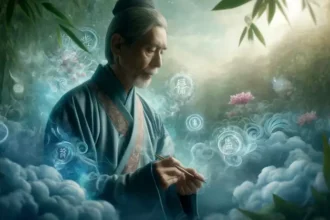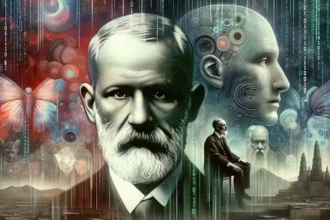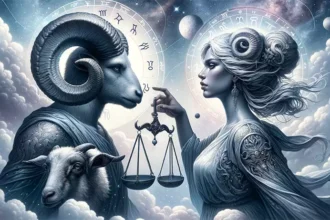Have you ever woken up puzzled by a dream about showing up to work in your pajamas or flying over your city like a superhero? Dreams can be wild, weird, and sometimes a bit too revealing!
Across cultures and religions, they’ve always held a special spot in the human psyche.
From prophetic visions in the Bible to nightly visits from the gods in Hindu mythology, dreams weave a complex tapestry of divine messages and deep personal insights. It’s not just about snoozing; it’s about tuning into a cosmic broadcast that predates Netflix by millennia!
So, buckle up as we dive into the mystical world of dreams across different faiths. Whether it’s guidance from the gods or subconscious Netflix binging effects, let’s decode what those zany nighttime escapades might actually mean.
Ready to dream-jump through cultures?
Christianity – Visions of the Divine

In Christian tradition, dreams are often seen as channels for divine messages. Key biblical figures like Joseph and Daniel were renowned for their dream interpretations, which were believed to be directly influenced by God.
This historical context sets a foundation for viewing dreams as potential communications from the divine in Christian thought.
Throughout the Bible, dreams serve as pivotal plot devices that guide decisions, reveal prophecies, and foretell events. For instance, Joseph’s ability to interpret dreams saves Egypt from famine, demonstrating the high regard for dreams within Christian scripture.
Such narratives reinforce the idea that God can use dreams as a means to speak to individuals.
However, the interpretation of dreams is approached with caution in Christianity. While some denominations consider dreams as meaningful, others view them as mere reflections of one’s subconscious thoughts.
This variance often depends on the theological leanings of the community, emphasizing the need for discernment and guidance from religious leaders.
Christian leaders and scholars frequently discuss the importance of context and symbolism in understanding dreams. They encourage prayer and reflection as tools to discern whether a dream has spiritual significance or is simply a byproduct of daily concerns.
This careful consideration helps maintain a balanced view of dreams within the Christian faith.
Judaism – Joseph’s Dream

Dreams have deep significance in Jewish thought, where they are often seen as potential gateways to divine messages. The Talmud states that a dream uninterpreted is like a letter unopened, suggesting that dreams hold messages waiting to be deciphered.
Jewish scholars and rabbis traditionally analyze these messages carefully.
Judaism categorizes dreams as prophecies or messages, influenced by the dreamer’s spiritual state. Not all dreams are considered meaningful; some are thought to be mere reflections of daily worries or desires.
When dreams are taken seriously, they might be discussed within the community or with a wise figure.
Significant dreams in Jewish history, such as Joseph’s dreams in the Book of Genesis, highlight the potential of dreams to foretell events or deliver guidance. These biblical examples reinforce the view of dreams as significant spiritual communications that can influence personal and collective life.
Interpretations are not taken lightly in Jewish culture. The meanings of dreams can be complex, with symbols often linked to the Hebrew Bible and rabbinic literature.
This rich tradition encourages a reflective approach to dreaming, where understanding one’s dreams is part of living a spiritually aware life.
Islam – Dreaming of the Prophet

Dreams hold a special place in Islam. They are seen as one of three types: truthful dreams, confusing dreams, and dreams from the devil.
Truthful dreams are thought to be messages from Allah, guiding and comforting the dreamer. Muslims often seek interpretations from knowledgeable figures.
Prophetic dreams, or true visions, are considered important spiritual signs. They are mentioned throughout the Quran and Hadith.
The Prophet Muhammad, for instance, frequently received revelations through dreams. These visions are highly respected and often discussed among Muslims to understand their deeper meanings.
However, not all dreams are viewed positively. Confusing dreams, or those hard to understand, are typically ignored as they are believed to have no clear meaning or benefit.
This attitude helps believers focus on dreams that offer clear guidance or messages.
Dream interpretation, or ‘ta’bir,’ remains a respected practice in Islamic culture. Skilled interpreters use symbols to uncover messages in dreams.
For example, seeing water might represent knowledge, while green clothing might signify righteousness. This practice connects deeply with daily spiritual life, helping believers find direction and reassurance.
Sikhism – Guidance from the Gurus

In Sikhism, dreams are not typically emphasized as spiritual or divine messages but are seen more as reflections of one’s mind and subconscious thoughts. The Sikh scripture, Guru Granth Sahib, suggests that life is like a dream, emphasizing the temporary nature of worldly experiences and the importance of focusing on the eternal, spiritual reality.
However, this does not mean that dreams are considered irrelevant. Sikhs might view dreams as insights into their desires, fears, and emotional states, offering a chance for self-reflection and personal growth.
This introspective use of dreams aligns with the Sikh emphasis on self-awareness and moral integrity.
While Sikhism does not encourage a literal interpretation of dreams as divine messages, the religion acknowledges that understanding one’s thoughts and feelings, even those expressed in dreams, can aid in spiritual development. This understanding helps adherents maintain a clear mind and a focused devotion.
The practical approach to dreams in Sikhism supports the faith’s overall focus on living a truthful, disciplined life, with dreams serving as one of many tools for achieving spiritual clarity and moral strength. This perspective helps Sikhs navigate their spiritual path with both feet firmly planted in reality.
Hinduism – Messages from the Gods

Hinduism views dreams as windows to the soul, offering both mundane and divine insights. Dreams can be messages from deities, reflections of inner desires, or even glimpses of past lives.
The content of these dreams often guides personal and spiritual decisions.
Sacred texts like the Upanishads discuss dreams extensively, illustrating their importance in Hindu philosophy. Dreams are not just nighttime phenomena but are part of the larger cycle of birth, life, death, and rebirth.
They are seen as vital for understanding one’s true self and the universe.
In Hindu tradition, some dreams are considered prophetic or extremely auspicious, indicating blessings from the gods or favorable changes in life. For instance, dreaming of a river might symbolize spiritual purification.
Conversely, nightmares might prompt one to seek remedies or perform rituals to avoid bad outcomes.
Like many aspects of Hindu culture, dreams blend the spiritual with the everyday. Dream interpreters, often priests or spiritual leaders, help decode these messages.
By understanding their dreams, Hindus feel they can align more closely with their life’s purpose and the wishes of the divine.
Buddhism – Enlightenment in Sleep
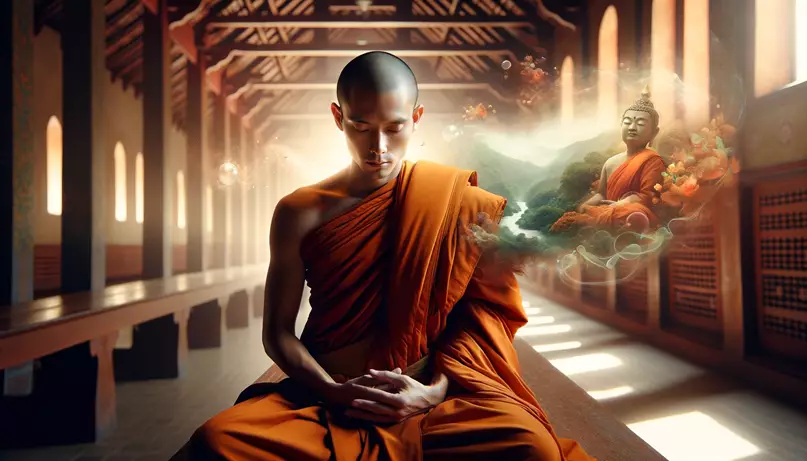
Buddhism teaches that dreams can reveal truths about ourselves and the world. They are viewed as manifestations of our desires, fears, and experiences.
Through dreams, Buddhists believe one can gain insights into the nature of reality and the self, advancing on the path to enlightenment.
Dreams play a significant role in Tibetan Buddhism, where practitioners use Dream Yoga. This practice involves becoming aware while dreaming to explore deeper states of consciousness and achieve spiritual insights.
It is a profound meditation tool that can lead to enlightenment.
Understanding dreams is also key to reducing suffering. By recognizing the impermanent and illusory nature of dreams, Buddhists learn to detach from the material world.
This detachment helps cultivate a peaceful mind and reduces the impact of negative emotions.
The interpretation of dreams in Buddhism often involves a more personal and introspective approach than in other religions. There is less focus on universal symbols and more emphasis on personal experiences and feelings.
This reflects the Buddhist belief in the unique path of each individual toward spiritual awakening.
Taoism – Harmony and Revelation

In Taoism, dreams are considered important spiritual experiences that can reveal deeper truths about the universe and oneself. They are seen as a means to transcend ordinary consciousness and tap into the subtle realms of existence.
This aligns with Taoist beliefs in the fluidity of reality and the interconnectedness of all things.
Dreams in Taoism can guide personal development and spiritual cultivation. They are often used as tools for diagnosis and healing in traditional Chinese medicine.
By interpreting dreams, practitioners can identify imbalances in one’s life force, or Qi, and suggest remedies to restore harmony.
Taoist dream practices also involve techniques to control and utilize dreams consciously. This includes dream incubation, where practitioners set intentions to dream about specific topics or questions, seeking guidance or solutions to problems.
The interpretation of dreams in Taoist practice is closely linked to the symbolism found in nature and the I Ching. Dreams are considered another layer of reality where the subtle energies of the universe communicate with the conscious mind, offering insights that are not easily accessed in waking life.
Shinto – Communing with Kami

In Shinto, the indigenous spirituality of Japan, dreams are seen as vital connections to the Kami (gods or spirits). These dreams can carry messages of wisdom or warnings from the spiritual world.
They play an important role in maintaining harmony between the spiritual and physical worlds, reflecting Shinto’s emphasis on natural and supernatural coexistence.
Dreams in Shinto may also guide individual behavior and decisions. When a person dreams of a particular Kami, it can indicate a need for a visit to a shrine to pay respects or make offerings.
Such visits are believed to restore balance and ensure good favor with the spirits.
Additionally, dreams can serve as omens or prophetic visions within Shinto practices. Particularly vivid or impactful dreams are often shared with community leaders or spiritual guides, who help interpret their meanings and implications for both the dreamer and the community.
The interpretation of dreams in Shinto is less about universal symbols and more about personal connections and community welfare. Dream insights are integrated into daily life and rituals, reinforcing the Shinto belief in the symbiosis between humans and the spiritual realm.
Native American – Visions and Guidance
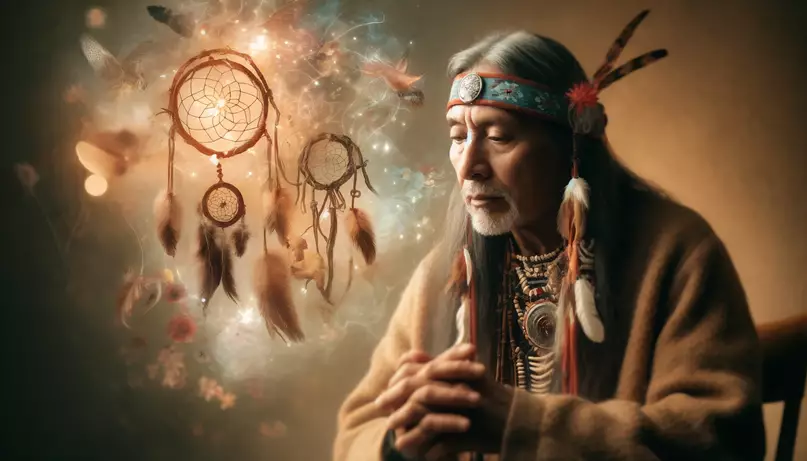
Dreams hold a special place in many Native American cultures, where they are often considered as sacred communications from the spirit world. These dreams provide guidance, offer healing, and connect individuals with their ancestors and spirit guides.
They are integral to personal and community spirituality.
Each tribe has its own traditions regarding dreams, but common themes include using dreams for vision quests or initiation rites. Young members of the community may seek visions through dreams as part of their passage into adulthood, receiving spiritual animals or guides that remain important throughout their lives.
Dreams are also used for healing in Native American cultures. Dream catchers, for example, are a well-known craft meant to protect the sleeper from bad dreams while allowing good dreams to pass through.
Healers and shamans may interpret someone’s dreams to find causes of physical or emotional distress.
Interpreting dreams often requires deep knowledge of tribal histories, myths, and nature. Elders or shamans usually perform this task, helping individuals understand the messages sent from the spirit world and how these messages can influence their daily lives and decisions.
This practice underscores the profound respect for dreams as links between the earthly and the spiritual.








